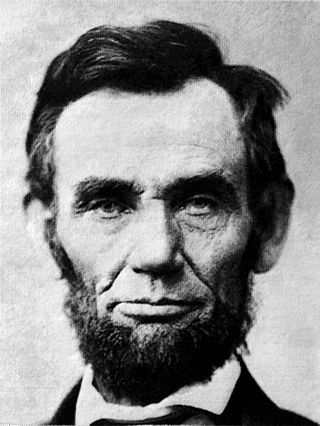
(Wikimedia CC; public domain)
“We can complain because rose bushes have thorns, or rejoice because thorn bushes have roses.”
Abraham Lincoln (assassinated just slightly more than 150 years ago)
We spent roughly three hours this morning in the Abraham Lincoln Presidential Museum in Springfield. It’s the second time we’ve visited the museum; it wasn’t yet built, I think, the first time that we came to town.
Let me simply say that, if you have even the slightest flicker of interest in Lincoln, the Civil War, or American history — or think that you might be capable of having such an interest — you should visit this place. It’s wonderful. Extremely well done, effortlessly informative, and, sometimes, deeply moving.
The remark of Mr. Lincoln’s that’s quoted above is especially poignant given the difficulty of his life, which included the death of his little brother in infancy; the sudden loss of his mother when he was nine; a possibly abusive and often absentee father; the death of his young married sister in childbirth; the death of his first serious romantic interest, Ann Rutledge, at age twenty-two; the apparent emotional instability of his wife, Mary Todd; many serious political defeats; the death of his three-year-old son Eddie in 1850, the death of his eleven-year-old son Willie in 1862, while he was in the White House; the incredible pressures that faced him from even before his first inauguration; the enormous death toll of the American Civil War, which many blamed on him; and his assassination in 1865. (His son Tad died at eighteen, but six years after Mr. Lincoln’s own death. Only Robert Todd Lincoln, Abraham and Mary’s firstborn son, outlived both parents; only Robert lived into his own old age.)
A week after Eddie’s death, Abraham and Mary Todd Lincoln published a poem in the Illinois State Journal, entitled “Little Eddie”:
Those midnight stars are sadly dimmed,
That late so brilliantly shone,
And the crimson tinge from cheek and lip,
With the heart’s warm life has flown –
The angel of Death was hovering nigh,
And the lovely boy was called to die.
The silken waves of his glossy hair
Lie still over his marble brow,
And the pallid lip and pearly cheek
The presence of Death avow.
Pure little bud in kindness given,
In mercy taken to bloom in heaven.
Happier far is the angel child
With the harp and the crown of gold,
Who warbles now at the Savior’s feet
The glories to us untold.
Eddie, meet blossom of heavenly love,
Dwells in the spirit-world above.
Angel Boy – fare thee well, farewell
Sweet Eddie, We bid thee adieu!
Affection’s wail cannot reach thee now
Deep though it be, and true.
Bright is the home to him now given
For “of such is the Kingdom of Heaven.”
I’m very fond of Edgar Lee Masters’s Spoon River Anthology. One of those poems is entitled “Ann Rutledge,” after the tragically short-lived young woman who — though some have sought to dispute the story — seems to have been Abraham Lincoln’s first love:
Out of me unworthy and unknown
The vibrations of deathless music:
“With malice toward none, with charity toward all.”
Out of me the forgiveness of millions toward millions,
And the beneficent face of a nation
Shining with justice and truth.
I am Ann Rutledge who sleeps beneath these weeds,
Beloved in life of Abraham Lincoln,
Wedded to him, not through union,
But through separation.
Bloom forever, O Republic,
From the dust of my bosom!
That poem is now engraved on her tombstone in the Oakland Cemetery at Petersburg, Illinois, where my wife and I paid our respects a number of years ago. (We passed not too far from Petersburg earlier today, but just didn’t have time.)
On a very different note: This evening, we enjoyed a Mexican dinner in Hamilton, Illinois, with Susan Easton Black and her husband, George Durrant. What a beautiful drive along the eastern bank of the Mississippi at sunset!
See? It’s not all melancholy around here.
Posted from Nauvoo, Illinois












